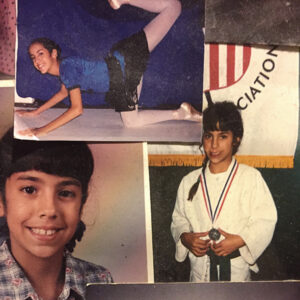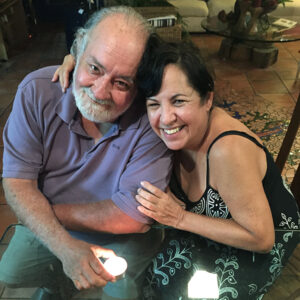Yara Travieso
Yara Travieso is a filmmaker, director, choreographer and writer. She is also a sister, daughter and first-generation immigrant. Her parents came to the U.S. from Venezuela and Cuba, settling in Miami, where Yara and her siblings grew up. Yara later moved to New York to study dance at the Julliard School. The Latin American traditions and culture of Yara’s family and community have influenced her work and life, and she draws from this background to carve out new and different narratives in her films and theatrical productions. Yara lives in Brooklyn, New York.

Yara remembers her childhood in Miami as a blend of art and love, rooted in her family’s immigrant heritage. “Our parents were both immigrants, and both really cared about making sure we had the best education we could. But I also grew up in a home where you could paint on the walls and write on the floor, where you could make a sculpture in the middle of the house. Both my father and my mother are artists, and our house was covered in art. It’s a home that’s an artistic cathedral of love. [While] I grew up in the United States, I grew up very much in a Latin American home. We never left behind that way of being. I was always speaking Spanish, listening to Latin music. English was tough for me. I really felt Latin American, though I was also aware that I was American. My parents were clear about it. We were living in this place, and we had certain opportunities here. Both my parents were adamant about education and creativity. My father would stay up late, helping me with my homework, and my mom would create wild art projects and costumes with us. It was an amazing balance to have that growing up.”
Yara’s parents are both artists, and from an early age she was interested in visual arts. While still in high school, she started a film festival in Miami as a way to tell stories of the people there. “Film and visual art was always a big part of our lives. My brother was a painter, my sister a designer, my father was an architect / painter, my mother was an artisan. Even as a young kid, I was making little films. I used to dance joropo, a Venezuelan traditional dance. I also grew up dancing salsa, and I loved it. I was always living in this cross-section, between a theatrical space and a visual space. It was this melding of the two worlds, where narrative and theater meets visual and moving image. When I direct, I’m really interested in the visual language, in addition to the human temperature of the scene. So that was sort of my early education and nurturing. I went to the New World School of the Arts High School in Miami, and I was surrounded by immigrant and first-generation kids, and grew up in a really diverse environment. I started the Borscht Film Festival with a couple other friends of mine. We were trying to pull out the stories and the uniqueness of our hometown. [Miami] is this kaleidoscope of people from different places, different backgrounds. I grew up with a need to tell these stories.”

Yara’s parents, Ruben and Ingrid.
It was a milestone for the family when both Yara and her brother were offered full scholarships to college. “That was a really important moment for our immigrant family. My brother had been following his trajectory as an artist, as an architect, and then he ended up going to school at Yale, on scholarship. In my mind, I’d said ‘I’m going to be a filmmaker’, but I’d been dancing my whole life. And then around that time, I was trying to decide whether to do film, or go to school for theater. When I got into Juilliard on scholarship, I think that’s something my parents hold close to their hearts. That they were able to get us to that place, where not only could we dream about going to these places, but to have the artistic freedom to not be scared. You know, to try and go for the things we wanted. I think that was an important step in our immigrant journey.”
Yara is passionate about sharing the influences of her cultural upbringing through her work. She strives to bring together her experiences to write characters and stories that have not traditionally had a platform. “My work often uses traditions from Latin American literature, Cuban literature, and traditions in music. Spiritual traditions, like Santería, different elements of the Caribbean that have always influenced, and have always been hovering around my life. So in my work, sometimes we don’t always follow the rules of what we expect of the narrative, and of the hero journey, but the rules of what I understand the world to be. As a woman and as a Latin American woman in between all the worlds. There was always that understanding in my mind, that ‘I can hold it all. I can be all these things.’ Same as I can be a director, and a writer, and a choreographer, and a filmmaker, because we are complicated. I can hold this anger, and this joy, and this vulnerability, and this stillness. That’s the influence of my immigrant family.

photo by Katia Repina
This month, Yara directed and released a film for Immigrant Heritage Month on the theme of home, and what it means to immigrants. Her family helped inspire the video. “I see my mom as a very heroic woman, she sort of made it work. She left her whole family behind [to move to the U.S.], and she had nobody, aside from the man she’d just gotten married to (my amazing papa). That’s kind of the metaphor behind the house that we grew up in, she just created this universe. She didn’t have anyone, she was in her late 20’s, and she created home from scratch. That’s a lot of my inspiration behind the IHM video, this idea of ‘home’. The understanding that home isn’t necessarily always a place, but it’s a feeling. The idea that our natural state is migration. We’ve been migrating since we came out of the womb. Migration is how we function as humans. A lot of the characters in the IHM film are drawn from my family, because I think of them often, and how they’ve handled the pain of separation and the readjustment of being in this new country. There’s a lot of heroism in the day-to-day, and trying to stay centered in the midst of an unstable situation. I admire my immigrant family more than they’ll ever know.”
#CELEBRATE IMMIGRANTS
We all know someone with an immigration experience or have an immigrant heritage story of our own. Join us to stay updated as we #CelebrateImmigrants across the country!


